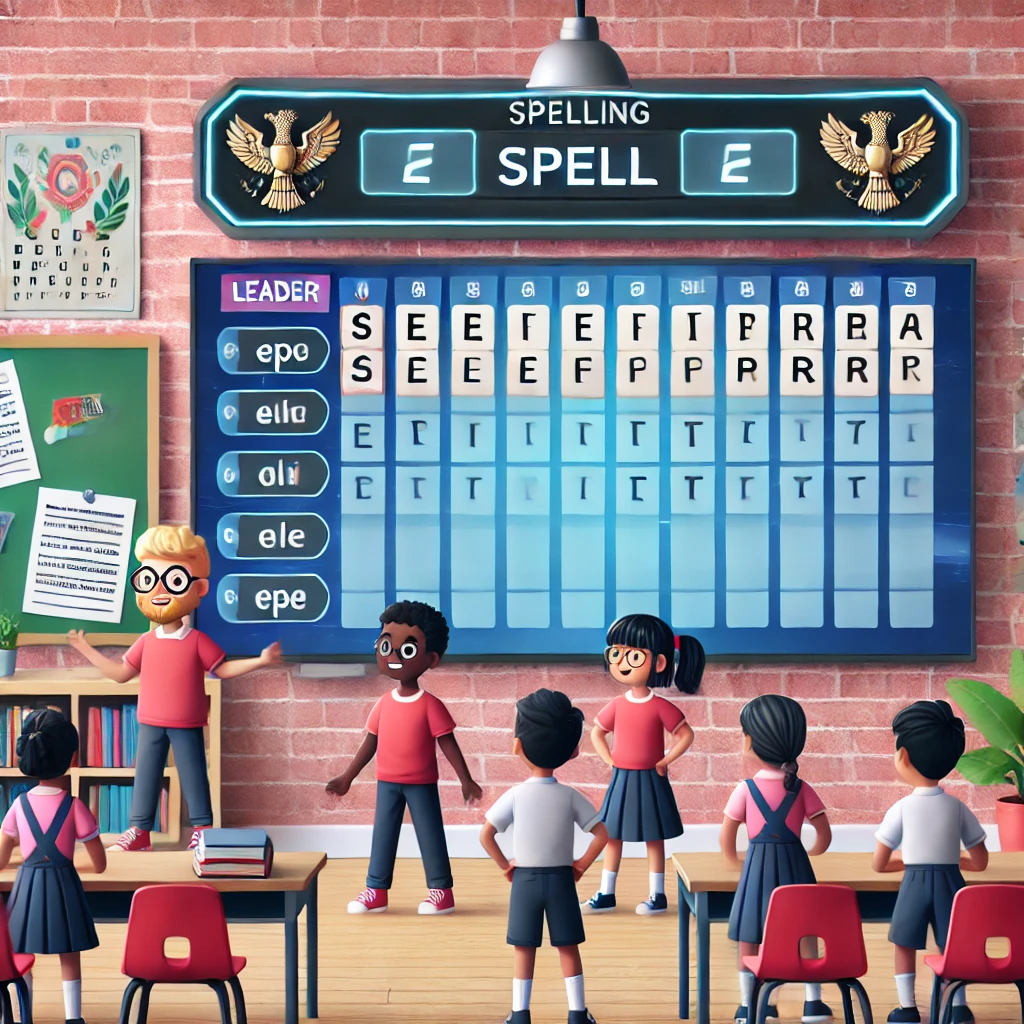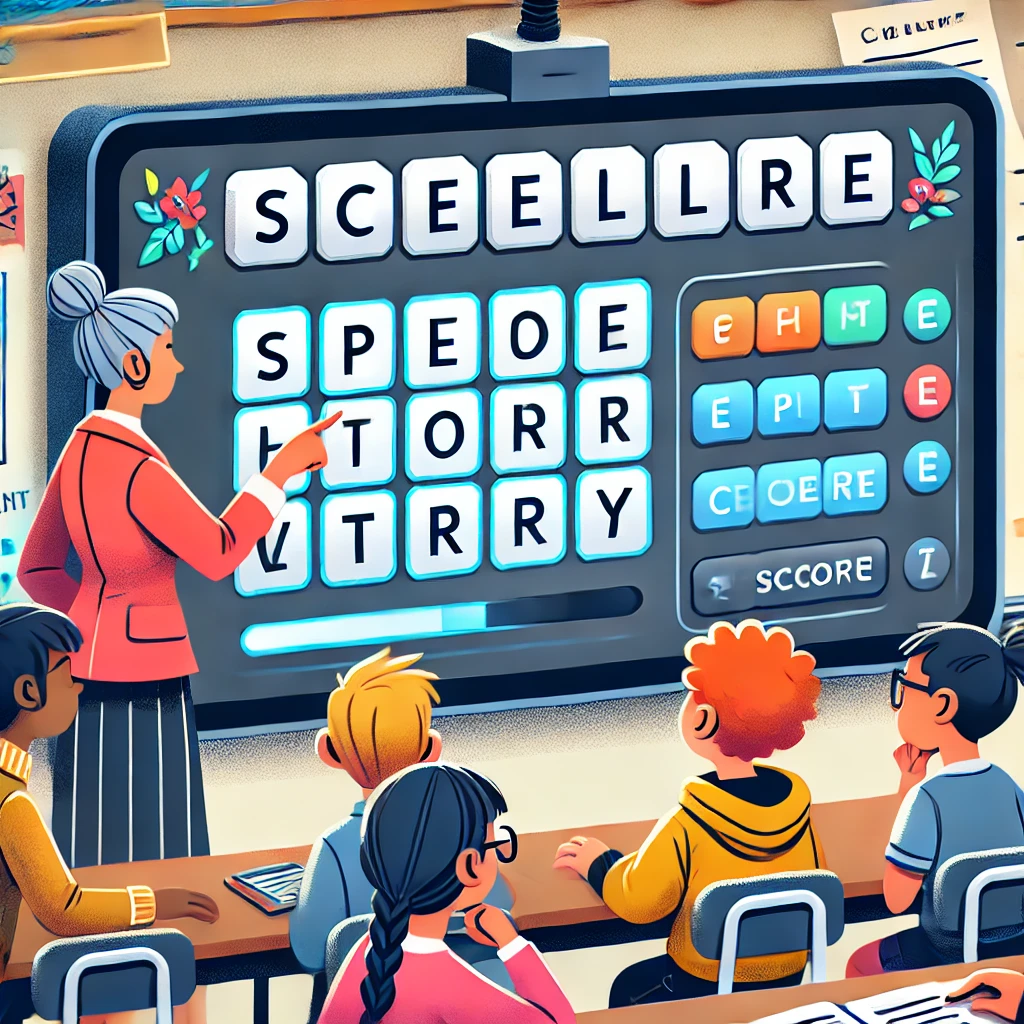
What Are Spellcheck Games?
Spellcheck games are interactive learning tools designed to enhance spelling skills through engaging activities. These games use a variety of challenges, such as word scrambles, missing-letter puzzles, and timed spelling tests, to help players practice correct spelling in a fun and motivating way. They are commonly used in educational settings, language learning applications, and online platforms that focus on literacy development.
Purpose of Spellcheck Games
The primary purpose of spellcheck games is to improve a player’s ability to recognize, recall, and correctly spell words. These games help reinforce proper spelling patterns, strengthen vocabulary, and develop a deeper understanding of language structure. They cater to different skill levels, making them useful for young learners, students with dyslexia, adults seeking to refine their writing skills, and even professionals aiming to enhance their language proficiency.
Key Points for Effective Use of Spellcheck Games
Spellcheck games are powerful tools for improving spelling proficiency, expanding vocabulary, and enhancing overall language skills. However, to maximize their effectiveness, learners must follow certain best practices. Regular engagement, learning from mistakes, and using varied exercises are crucial for long-term success. Below are key strategies to ensure effective use of spellcheck games.
1. Regular Practice Improves Proficiency in Identifying Misspellings
Consistent practice is essential for mastering spelling skills. The more frequently a learner engages with spellcheck games, the better they become at spotting and correcting errors.
Why Regular Practice Matters
- Builds Muscle Memory: Just like learning a musical instrument or a new sport, repeated exposure to correct spelling reinforces memory and recognition.
- Enhances Speed and Accuracy: Over time, learners develop quicker reflexes in identifying spelling mistakes, leading to faster and more accurate writing.
- Develops a Habit of Self-Checking: Regular interaction with spelling challenges trains the brain to be more attentive to spelling errors in everyday writing.
How to Incorporate Regular Practice
- Set a Daily or Weekly Routine: Dedicate a few minutes each day to playing a spellcheck game or completing a spelling quiz.
- Challenge Yourself with Timed Exercises: Practicing under time constraints can improve focus and response time.
- Mix Different Types of Games: Engaging with a variety of spelling activities (word scrambles, quizzes, typing challenges) keeps learning interesting and comprehensive.
2. Learning from Mistakes Is Crucial for Long-Term Improvement
To avoid mistakes Instead of avoiding errors, effective learners analyze their mistakes and use them as opportunities for growth.
Why Learning from Mistakes is Important
- Identifies Weaknesses: Recognizing frequently misspelled words helps learners focus on problem areas.
- Encourages Active Learning: Instead of passively memorizing words, learners actively engage in understanding spelling rules and patterns.
- Promotes Retention: Studies show that people remember words better when they correct their own mistakes.
How to Learn from Mistakes Effectively
- Review Incorrect Answers: After each game or spelling test, take time to go through missed words and understand why they were incorrect.
- Use a Notebook for Difficult Words: Writing down commonly misspelled words reinforces learning.
- Apply Corrections in Writing: Incorporating newly learned words into daily writing (essays, notes, emails) helps reinforce correct spelling.
3. Maximizing the Learning Experience with Spellcheck Games
While spellcheck games are beneficial, their effectiveness depends on how they are used. Diversifying learning methods and using structured techniques can enhance their impact.
Best Practices for Maximizing Spellcheck Game Benefits
- Gradually Increase Difficulty: Start with simple words and progressively challenge yourself with more complex vocabulary.
- Combine with Other Learning Tools: Use spellcheck games alongside books, spelling apps, and writing exercises for a well-rounded approach.
- Engage in Group Activities: Playing spelling games with classmates, friends, or family adds a social element to learning, making it more enjoyable.
- Utilize Online Resources: Many educational platforms provide progress tracking and personalized learning plans, making it easier to measure improvement.
Educational Benefits of Spellcheck Games

Spellcheck games offer a dynamic and engaging approach to improving spelling proficiency. These games provide learners with interactive experiences that make spelling practice enjoyable while reinforcing important language skills.
1. Enhance Spelling Skills Through Active Engagement
Traditional spelling exercises often rely on rote memorization, which can be tedious for students. Spellcheck games, on the other hand, transform learning into an interactive and stimulating experience. By identifying and correcting spelling errors, players actively participate in the learning process rather than passively memorizing words.
How Active Engagement Improves Spelling
- Hands-on Learning: Instead of just reading or writing words, players interact with them in puzzles, word searches, and spelling challenges.
- Immediate Feedback: Many games provide instant corrections, allowing learners to recognize their mistakes and improve immediately.
- Memory Reinforcement: Frequent exposure to correct spellings helps students retain word structures more effectively.
- Motivation Through Gamification: Features like scoreboards, time challenges, and rewards encourage learners to keep practicing.
2. Improve Vocabulary by Recognizing Patterns Among Words
Spellcheck games help expand vocabulary by exposing players to new words and highlighting spelling patterns. Understanding common prefixes, suffixes, and word roots can make it easier to spell unfamiliar words correctly.
Ways Spellcheck Games Improve Vocabulary
- Word Association: Many games group words with similar patterns, helping learners recognize relationships between words (e.g., “light,” “bright,” “sight”).
- Phonetic Awareness: Some games emphasize the connection between sounds and spelling, improving phonemic recognition.
- Contextual Learning: Advanced spellcheck games provide example sentences, allowing learners to understand word meanings along with correct spelling.
- Repetition for Retention: Frequent encounters with new words reinforce learning and make vocabulary expansion more natural.
3. Online Tools for Spelling Improvement
Digital platforms provide convenient and effective tools for enhancing spelling skills. Online spellcheck games and applications use technology to personalize learning experiences, track progress, and provide adaptive challenges based on a learner’s skill level.
Popular Online Tools for Spelling Improvement
- SpellQuiz: Offers interactive quizzes and spelling tests to challenge learners of all ages.
- Grammarly Spelling Checker: Detects and corrects spelling errors in real time, making it a valuable tool for students and professionals.
- Spelling City: A fun and educational platform that provides customized spelling lists and engaging word games.
- BBC Bitesize Spelling Games: Provides spelling exercises designed to improve literacy skills through interactive challenges.
- Merriam-Webster Spell It!: A game-based learning tool that helps users master commonly misspelled words.
Advantages of Online Spelling Tools
- Self-Paced Learning: Users can practice at their own speed and revisit words they find challenging.
- Interactive Features: Many tools incorporate audio, animations, and quizzes to enhance engagement.
- Accessibility: Available on multiple devices, allowing learners to practice anytime, anywhere.
- Customizable Word Lists: Many platforms allow users to create personalized spelling challenges based on their learning needs.
Types of Spellcheck Games
1. Detective Spellcheck Game
Objective
The Detective Spellcheck Game is designed to help students improve their spelling skills by identifying incorrect spellings in a list of words. This interactive approach sharpens their attention to detail and enhances their ability to recognize common spelling errors.
Method
- The teacher or facilitator writes a list of correctly spelled words on the board.
- One word from the list is erased and rewritten with a deliberate spelling mistake.
- Students carefully examine the updated list to spot the misspelled word.
- Once they find the error, they either correct it individually or discuss it as a group.
- This process can be repeated with different words to reinforce learning.
Grades
This game is ideal for students in grades K-8. Younger students can start with simple words, while older students can be challenged with more complex vocabulary and commonly confused words.
2. Online SpellCheck Game
Features
Online SpellCheck Games are digital spelling challenges that offer interactive and engaging experiences through various difficulty levels. They are designed to enhance spelling accuracy, pattern recognition, and learning from mistakes.
Key Features:
- Daily Puzzles: Players receive new spelling challenges every day, keeping the learning process fresh and engaging.
- Varying Difficulty Levels: The game adjusts to the player’s proficiency, offering simple words for beginners and complex words for advanced learners.
- Limited Attempts: To increase the challenge, players are given a fixed number of chances to correct their spelling before the game ends. This feature encourages careful observation and thoughtful decision-making.
- Pattern Recognition: By repeatedly encountering similar words and common spelling mistakes, players develop a strong sense of correct spelling patterns.
- Learning from Mistakes: Many online spellcheck games provide instant feedback, explaining errors and suggesting correct spellings, helping users improve over time.
Benefits of Online SpellCheck Games
- Suitable for all age groups, from children to adults.
- Available on multiple platforms, including mobile apps and websites.
- Helps learners practice spelling at their own pace, making it a flexible learning tool.
- Enhances cognitive skills like memory, concentration, and problem-solving.
Popular Types of Spellcheck Games
- Word Scrambles – Players rearrange letters to form correct words.
- Fill-in-the-Blanks – A missing letter or portion of a word needs to be filled in.
- Spelling Bees – Players spell words correctly from auditory cues.
- Typing Challenges – Speed and accuracy in typing words are tested.
- Multiple-Choice Quizzes – Players select the correctly spelled word from options.
Who Can Benefit from Spellcheck Games?
- Students – Helps children and young learners build a strong spelling foundation.
- Teachers – Provides an engaging way to teach spelling in classrooms.
- ESL Learners – Assists non-native speakers in mastering English spelling.
- Adults – Offers a way to improve professional and academic writing.
Conclusion
Spellcheck games are effective tools for enhancing spelling skills, but their success depends on regular practice, learning from mistakes, and using a variety of exercises. By consistently engaging with spelling challenges and analyzing errors, learners can develop long-term proficiency. Whether for students, professionals, or language learners, incorporating these key points ensures maximum benefits from spellcheck games, leading to improved spelling accuracy and overall language confidence.
FAQs
1. What are the best strategies to improve spelling skills?
Regular practice, learning from mistakes, using mnemonic techniques, reading frequently, and engaging in interactive spelling games help improve spelling skills effectively.
2. How can I adapt the Detective Spellcheck Game for older students?
For older students, increase difficulty by using complex vocabulary, incorporating homophones, and adding time constraints. You can also use sentences instead of single words to challenge contextual spelling skills.
3. Are there any other interactive spelling games similar to Spellcheck?
Yes, games like Scrabble, Boggle, Word Search, Hangman, and Spelling Bee competitions offer interactive ways to practice spelling while keeping learning engaging.
4. What are the benefits of playing spelling games regularly?
Spelling games enhance word recognition, improve vocabulary, boost memory retention, increase confidence in writing, and make learning more enjoyable through gamification.
5. How can I incorporate technology into spelling lesson plans?
Use spelling apps, online quizzes, voice-to-text tools, interactive whiteboards, and gamified learning platforms like Spelling City or Kahoot to integrate technology into spelling lessons.





